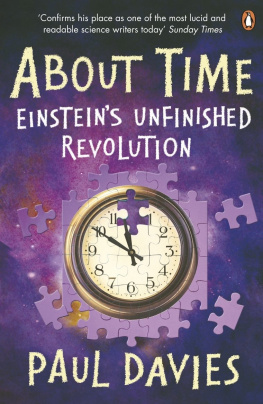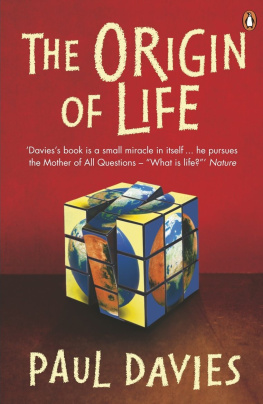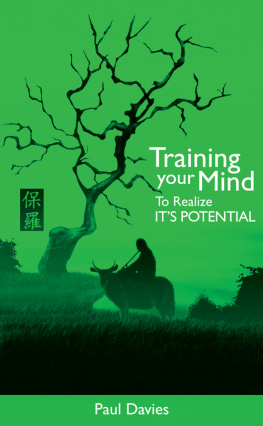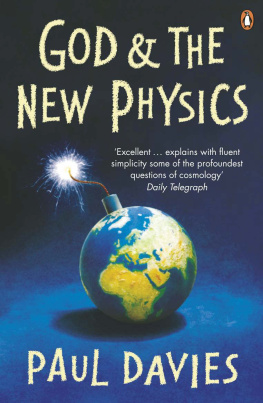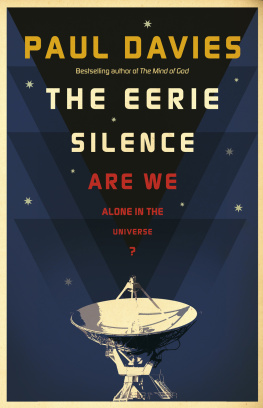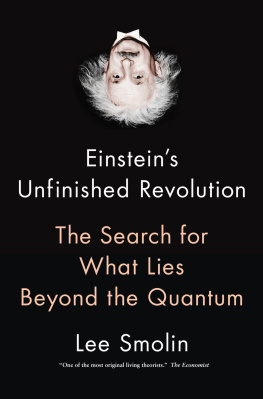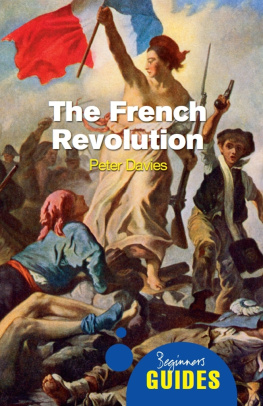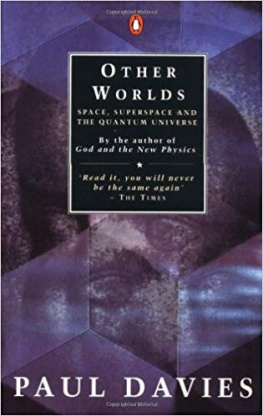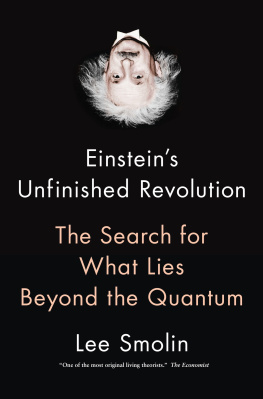Paul Davies - About Time: Einsteins Unfinished Revolution
Here you can read online Paul Davies - About Time: Einsteins Unfinished Revolution full text of the book (entire story) in english for free. Download pdf and epub, get meaning, cover and reviews about this ebook. year: 2006, publisher: Penguin Books Ltd, genre: Science fiction. Description of the work, (preface) as well as reviews are available. Best literature library LitArk.com created for fans of good reading and offers a wide selection of genres:
Romance novel
Science fiction
Adventure
Detective
Science
History
Home and family
Prose
Art
Politics
Computer
Non-fiction
Religion
Business
Children
Humor
Choose a favorite category and find really read worthwhile books. Enjoy immersion in the world of imagination, feel the emotions of the characters or learn something new for yourself, make an fascinating discovery.
- Book:About Time: Einsteins Unfinished Revolution
- Author:
- Publisher:Penguin Books Ltd
- Genre:
- Year:2006
- Rating:4 / 5
- Favourites:Add to favourites
- Your mark:
- 80
- 1
- 2
- 3
- 4
- 5
About Time: Einsteins Unfinished Revolution: summary, description and annotation
We offer to read an annotation, description, summary or preface (depends on what the author of the book "About Time: Einsteins Unfinished Revolution" wrote himself). If you haven't found the necessary information about the book — write in the comments, we will try to find it.
About Time: Einsteins Unfinished Revolution — read online for free the complete book (whole text) full work
Below is the text of the book, divided by pages. System saving the place of the last page read, allows you to conveniently read the book "About Time: Einsteins Unfinished Revolution" online for free, without having to search again every time where you left off. Put a bookmark, and you can go to the page where you finished reading at any time.
Font size:
Interval:
Bookmark:
PENGUIN BOOKS
ABOUT TIME
Paul Davies is an internationally acclaimed physicist, writer and broadcaster, now based in South Australia. He obtained a Ph.D. from the University of London and has worked at the universities of London, Cambridge, Newcastle upon Tyne and Adelaide. He is currently Professor of Natural Philosophy at the Australian Centre for Astrobiology, Macquarie University, Sydney, and he holds a Visiting Professorship at Imperial College in London. His research interests are in the field of black holes, cosmology and quantum gravity. Professor Davies is the author of more than twenty books, including, in Penguin, The Fifth Miracle, Superforce, The Mind of God, God and the New Physics, The Edge of Infinity, The Cosmic Blueprint, Are We Alone? and Other Worlds.
He is the recipient of a Glaxo Science Writers' Fellowship, an Advance Australia Award and a Eureka prize for his contributions to Australian science, and in 1995 he won the prestigious Templeton Prize for his work on the deeper meaning of science. The Mind of God won the 1992 Eureka book prize and was also shortlisted for the Rhne-Poulenc Science Book Prize, as was About Time in 1996. His work on bringing science to the wider public was recognized in 2001 by the award of the Kelvin Medal and Prize by the Institute of Physics.
EINSTEIN'S
UNFINISHED REVOLUTION

PENGUIN BOOKS
PENGUIN BOOKS
Published by the Penguin Group
Penguin Books Ltd, 80 Strand, London WC2R 0RL, England
Penguin Putnam Inc., 375 Hudson Street, New York, New York 10014, USA
Penguin Books Australia Ltd, 250 Camberwell Road, Camberwell, Victoria 3124, Australia
Penguin Books Canada Ltd, 10 Alcorn Avenue, Toronto, Ontario, Canada M4V 3B2
Penguin Books India (P) Ltd, 11 Community Centre, Panchsheel Park, New Delhi 110 017, India
Penguin Books (NZ) Ltd, Cnr Rosedale and Airborne Roads, Albany, Auckland, New Zealand
Penguin Books (South Africa) (Pty) Ltd, 24 Sturdee Avenue, Rosebank 2196, South Africa
Penguin Books Ltd, Registered Offices: 80 Strand, London WC2R 0RL, England
www.penguin.com
First published in the USA by Simon and Schuster 1995
Published simultaneously in Great Britain by Viking
Published in Penguin Books 1995
Copyright Orion Productions, 1995
All rights reserved
The moral right of the author has been asserted
Except in the United States of America, this book is sold subject to the condition that it shall not, by way of trade or otherwise, be lent, re-sold, hired out, or otherwise circulated without the publisher's prior consent in any form of binding or cover other than that in which it is published and without a similar condition including this condition being imposed on the subsequent purchaser
ISBN: 978-0-14-195198-0
I dedicate this book to my long-suffering family.
The time I spent writing it belonged to them.
This is the second book I have written on the subject of time. The first, published in 1974, was intended for professional physicists. I always intended to write another book on this subject, for the wider public, but somehow I never found the time. At last I have accomplished it.
Fascination with the riddle of time is as old as human thought. The earliest written records betray confusion and anxiety over the nature of time. Much of Greek philosophy was concerned with making sense of the concepts of eternity versus transience. The subject of time is central to all the world's religions, and has for centuries been the source of much doctrinal conflict.
Although time entered science as a measurable quantity with the work of Galileo and Newton, it is only in the present century that it has developed into a subject in its own right. Albert Einstein, more than anyone else, is responsible for this advance. The story of time in the twentieth century is overwhelmingly the story of Einstein's time. Although I have sketched biographical details where appropriate, this book is not a biography of Einstein, because several such have appeared since his centenary in 1979. Nor did I set out to write a systematic and comprehensive study of time. Instead, I have chosen a selection of topics that I personally find particularly intriguing or mysterious, and used them to illustrate the general principles of time as we have come to understand them.
Although Einstein's theory of relativity is nearly a century old, its bizarre predictions are still not widely known. Invariably people learn of them with delight, fear and perplexity. Much of the book is devoted to covering the more straightforward consequences of the theory; the broad conclusion I reach, however, is that we are far from having a good grasp of the concept of time. Einstein's work triggered a revolution in our understanding of the subject, but the consequences have yet to be fully worked out. Much of the theory of relativity remains uncharted territory, and crucial topics, like the possibility of time travel, have only very recently received attention. There are also major problems which hint at deep-seated limitations of the theory; discrepancies concerning the age of the universe and obstacles to unifying Einstein's time with quantum physics are two of the more persistent difficulties. Perhaps more worryingly, Einstein's time is seriously at odds with time as we human beings experience it. All this leads me to believe that we must embrace Einstein's ideas, but move on. The orthodox account of time frequently leaves us stranded, surrounded by a welter of puzzles and paradoxes. In my view, Einstein's time is inadequate to explain fully the physical universe and our perception of it.
The scientific study of time has proved to be disturbing, disorienting and startling. It is also befuddling. I have written this book for the reader with no specialist scientific or mathematical knowledge. Technical jargon is kept to a minimum, and numerical values are avoided except where absolutely necessary. However, I cannot deny that the subject is complex and intellectually challenging. To try and ease the pain a bit, I have resorted to the device of introducing a tame imaginary skeptic, who may from time to time voice the reader's own objections or queries. Nevertheless, you may well be even more confused about time after reading this book than you were before. That's all right; I was more confused myself after writing it.
Many people have helped me shape my ideas of time over the years. I have especially benefited from discussions and debate with John Barrow, George Efstathiou, Murray Gell-Mann, Ian Moss, James Hartle, Stephen Hawking, Don Page, Roger Penrose, Frank Tipler, William Unruh and John Wheeler. Others whose work has influenced me are mentioned in the text. Thanks must also go to my immediate colleagues and friends, who have provided many useful ideas and insights into the subject. These include Diane Addie, David Blair, Bruce Dawson, Roger Clay, Philip Davies, Susan Davies, Michael Draper, Denise Gamble, Murray Hamilton, Angas Hurst, Andrew Matacz, James McCarthy, Jesper Munch, Graham Nerlich, Stephen Poletti, Peter Szekeres, Jason Twamley and David Wiltshire. Last but by no means least is Anne-Marie Grisogono, whose critical reading of the manuscript and challenging discussions of the subject matter have proved invaluable.
Next pageFont size:
Interval:
Bookmark:
Similar books «About Time: Einsteins Unfinished Revolution»
Look at similar books to About Time: Einsteins Unfinished Revolution. We have selected literature similar in name and meaning in the hope of providing readers with more options to find new, interesting, not yet read works.
Discussion, reviews of the book About Time: Einsteins Unfinished Revolution and just readers' own opinions. Leave your comments, write what you think about the work, its meaning or the main characters. Specify what exactly you liked and what you didn't like, and why you think so.

